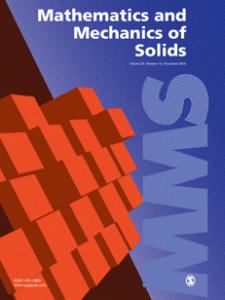 The editor and author of most of the papers in a special issue of a math journal told us he is withdrawing the entire issue following revelations that he had coordinated the peer-review process.
The editor and author of most of the papers in a special issue of a math journal told us he is withdrawing the entire issue following revelations that he had coordinated the peer-review process.
The articles, published online earlier this year, recently received an expression of concern after the journal realized the guest editor David Gao, at the Federation University Australia, had coordinated the peer-review process. This was a major no-no, since Gao was also an author of 11 of the 13 papers. Mathematics and Mechanics of Solids slated the articles to be peer reviewed again, by reviewers not chosen by Gao.
Gao told us what happened next, from his perspective — he changed his mind about publishing the papers in MMS:
Due to the fact that this special issue is on a unified theory with applications in multidisciplinary fields, and 2/3 of papers are on global optimization and algorithms, which are not within the scope of MMS, my co-editors and I think it will be much better to have a book published in a multidisciplinary book series by a leading publisher.
Our book proposal has been approved very recently. The publisher is very happy with this book and tell us there is no conflict for editors to publish their own high quality papers in the book.
So we have asked to withdraw this special issue from MMS. Only two authors asked if their papers can be published in a regular issue of MMS in the current form due to certain reason. Since these two papers are not directly related to mechanics, the editor-in-chief is talking with the MMS publisher and I am waiting for the final news.
Now, my co-editors and I are very happy with this right decision, to have this excellent book published by a leading publisher in a right series within two months, which should be faster than by MMS and with much more readers.
A spokesperson for Sage, which publishes MMS, told us that the journal is processing the request:
In accordance with industry agreed guidelines set out by the Committee for Publication Ethics (COPE), SAGE is formally still in the process of reviewing the Special Issue on Advances in Canonical Duality Theory, guest-edited by Professor David Gao in a forthcoming edition of Mathematics and Mechanics of Solids. The Editor-in-Chief and SAGE take this situation very seriously and we are working with all parties to ensure a speedy, fair and formal resolution.
Recently, the Guest Editor requested to retract the Special Issue due to conflict of interest raised regarding the peer review process as he was co-author on a number of submitted papers. The Guest Editor takes full responsibility for the retraction and the article authors may resubmit their work as separate papers.
The Editor-in-Chief and SAGE are now working through the Guest Editor’s request and are processing the necessary arrangements before we make any formal retraction notice. The Editor-in-Chief and SAGE expect the formal process to be completed towards the middle of next week, at the earliest.
Gao suggested that people raised questions about the special issue after he published research raising questions about previous findings:
I wish I have time to tell you the reason why this special issue was questioned.
If you ever read my recent papers, say http://arxiv.org/abs/1507.08748
you may find answer. This article proved some basic mistakes in two most cited papers in 70’s, so some people were very upset and…Well, this matter shows a simple truth: A breakthrough theory must go through serious challenges before to be recognized.
We’ve contacted editor of the journal, too. We will update this post with anything else we learn.
Like Retraction Watch? Consider making a tax-deductible contribution to support our growth. You can also follow us on Twitter, like us on Facebook, add us to your RSS reader, and sign up on our homepage for an email every time there’s a new post. Click here to review our Comments Policy.